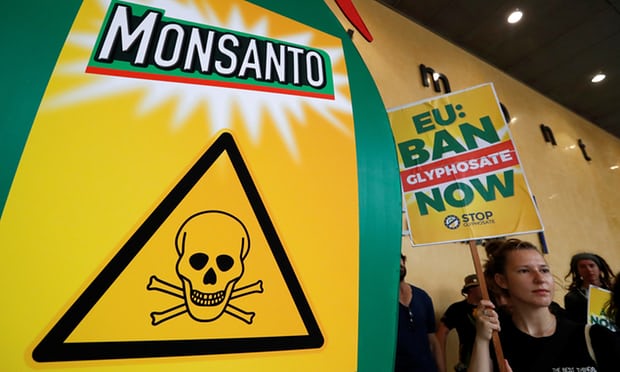Monsanto Banned from European Parliament
EUROPE, ENVIRONMENT, ORGANIC, GMO, GENETIC ENGINEERING, 2 Oct 2017
MEPs withdraw parliamentary access after the firm shunned a hearing into allegations that it unduly influenced studies into the safety of glyphosate used in its RoundUp weedkiller.

People protest against a planned $66bn takeover of Monsanto by Bayer and Monsanto’s glyphosate herbicides, in Brussels, July 2017.
Photograph: Yves Herman/Reuters
28 Sep 2017 – Monsanto lobbyists have been banned from entering the European parliament after the multinational refused to attend a parliamentary hearing into allegations of regulatory interference.
It is the first time MEPs have used new rules to withdraw parliamentary access for firms that ignore a summons to attend parliamentary inquiries or hearings.
Monsanto officials will now be unable to meet MEPs, attend committee meetings or use digital resources on parliament premises in Brussels or Strasbourg.
While a formal process still needs to be worked through, a spokesman for the parliament’s president Antonio Tajani said that the leaders of all major parliamentary blocks had backed the ban in a vote this morning.
“One has to assume it is effective immediately,” he said.
MEPs had been incensed at a Monsanto decision to shun a hearing organised by the environment and agriculture committees, with academics, regulators and campaigners, on 11 October.
The meeting is expected to hear allegations that Monsanto unduly influenced regulatory studies into the safety of glyphosate, a key ingredient in its best-selling RoundUp weedkiller.
EU report on weedkiller safety copied text from Monsanto study
“Those who ignore the rules of democracy also lose their rights as a lobbyist in the European parliament,” said the Green party president Philippe Lamberts. “US corporations must also accept the democratic control function of the parliament. Monsanto cannot escape this.”
The lobby ban will be a bitter blow to Monsanto’s advocacy campaign ahead of a decision later this year about the relicensing of glyphosate, which has been linked to cancer by one expert WHO panel.
Another deemed it safe for public use, but Monsanto’s outreach to regulatory agencies in the US and Europe sparked controversy and prompted the parliamentary hearing.
A Monsanto letter to MEPs seen by the Guardian said that the European parliament was not “an appropriate forum” for discussion on the issues involved.
“The joint hearing could be viewed as the latest attempt by those opposed to modern agricultural practices to influence and frustrate the EU scientific and regulatory process to suit their own agenda,” it says.
“We have observed with increasing alarm the politicisation of the EU procedure on the renewal of glyphosate,” wrote Monsanto’s vice president Philip Miller, “a procedure which should be scientific but which in many respects has been hijacked by populism.”
Martin Pigeon, a spokesman for the NGO Corporate Europe Observatory, said it was “extremely important that parliament has been prepared to meet Monsanto’s unbelievable arrogance with real retaliation and consequences.”
Monsanto spends between €300,000-€400,000 (£260,000 – £350,000) annually on lobbying in Brussels, according to its self-declaration form in the EU transparency register.
Go to Original – theguardian.com
DISCLAIMER: The statements, views and opinions expressed in pieces republished here are solely those of the authors and do not necessarily represent those of TMS. In accordance with title 17 U.S.C. section 107, this material is distributed without profit to those who have expressed a prior interest in receiving the included information for research and educational purposes. TMS has no affiliation whatsoever with the originator of this article nor is TMS endorsed or sponsored by the originator. “GO TO ORIGINAL” links are provided as a convenience to our readers and allow for verification of authenticity. However, as originating pages are often updated by their originating host sites, the versions posted may not match the versions our readers view when clicking the “GO TO ORIGINAL” links. This site contains copyrighted material the use of which has not always been specifically authorized by the copyright owner. We are making such material available in our efforts to advance understanding of environmental, political, human rights, economic, democracy, scientific, and social justice issues, etc. We believe this constitutes a ‘fair use’ of any such copyrighted material as provided for in section 107 of the US Copyright Law. In accordance with Title 17 U.S.C. Section 107, the material on this site is distributed without profit to those who have expressed a prior interest in receiving the included information for research and educational purposes. For more information go to: http://www.law.cornell.edu/uscode/17/107.shtml. If you wish to use copyrighted material from this site for purposes of your own that go beyond ‘fair use’, you must obtain permission from the copyright owner.
Read more
Click here to go to the current weekly digest or pick another article:
EUROPE:
- Germany’s New Political Landscape
- Armenia and Its Diaspora: A Tapestry of Tension and Triumph
- Biological Apocalypse in Armenia Is Not Far Off
ENVIRONMENT:
ORGANIC, GMO, GENETIC ENGINEERING: